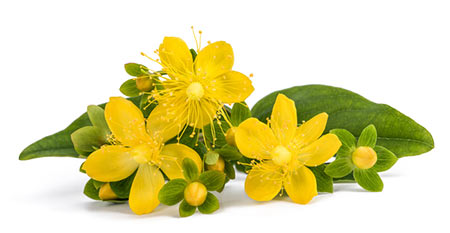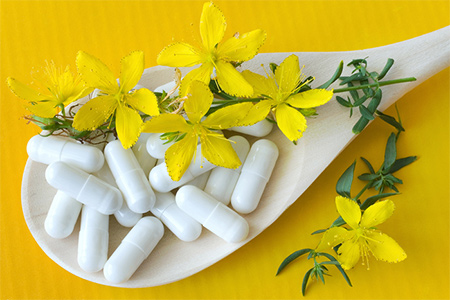
With an ever-increasing trend to using more natural treatments and therapies, especially in considering long term treatment or an ongoing “maintenance” health protocol, St. John’s Wort has long been utilized, scrutinized and debated as to its’ efficacy in treating depression and mood related disorders.
St. John’s Wort is a flowering shrub native to Europe. And it got it’s name because it typically blooms on the birthday of St. John the Baptist. The medicinal attributes of St. John’s Wort are found in the flowers, which contain the active ingredients hypericin, pseudohypericin and hyperforin. It is these active ingredients that make this plant and the supplements created from it, attractive as a means to treat depression.
You can find St. John’s Wort as a tea, a tonic, tablets and capsules as well as topical preparations. But the big question is . . . “Does it work?”

St. John’s Wort is primarily used for and believed by many, to be an effective treatment for depression. I believe it is important to note however, that medically reviewed testing of St. John’s Wort mostly reports its’ effectiveness on mild to moderate depression and not severe cases where more intense therapy and/ prescription medication is required.
It is the active ingredients hypericin and hyperforin of St. John’s Wort that have a direct effect on depression and anxiety because these two compounds have been found to inhibit the uptake of serotonin. (1)
Why is this a good thing? Well for starters, serotonin is a chemical that our body produces which is believed to regulate our moods and support healthy social behaviors. If our serotonin levels are such that we become depressed and start to withdraw from life, the potential that St. John’s Wort can help remedy that, would be seen as a blessing to many.
While there is some strong evidence to support that St. John’s Wort may be as effective as some prescription antidepressants, the evidence is still very much conflicting. It is also being studied for its’ effectiveness in treating other emotional and mental wellness concerns such as obsessive compulsive disorder (OCD), seasonal affective disorder (SAD) and anxiety related disorders. (2)

I was able to find one other study conducted by the Cochrane Infectious Disease Group claiming that the use of St. John’s wort was effective in treating major depression . . . “ Overall, the St. John’s wort extracts tested in the trials were superior to placebo, similarly effective as standard antidepressants, and had fewer side effects than standard antidepressants.” (6)
Please keep in mind in reading the above, that this was the only study that I found, that made such a claim and before I go out on a limb and give it 100% backing, I would want to do much more research about this. Why? Well, because depression can be a very serious illness that leads to other mental health issues, and this should not ever be taken lightly, especially when discussing forms of effective treatment.
Another study, or rather an analysis of studies, that I found very interesting was conducted in 2017 and was based on 27 studies involving the use of St. John’s wort to treat depression. What this broad range analysis concluded was that St. John’s wort did in fact reduce the symptoms of mild to moderate depression as much as prescribed antidepressants did.

This analysis further concluded that more people continued to take the St. John’s wort supplement, whereas those taking prescribed antidepressants, often stopped taking them. (7) So I think at this point it is safe to say that there is sufficient evidence to support that taking St. John’s Wort may help to reduce symptoms of depression, and in some studies there appears to be enough evidence to back up that it has helped some in research participants as much as their prescribed medication.
However, it must also be brought to your attention that these are medically supervised research studies done with individuals diagnosed as having mild to moderate depression.
Individuals with severe depression MUST ALWAYS consult with a doctor and/ therapist to determine the best course of treatment. Depression is not something to be taken lightly and if left untreated or not treated properly can lead to other mental health concerns. So while St. John’s wort may sound like a wonderful option and one you want to explore please FIRST consult with your doctor.

While there are a lot of great things that can be said about St. John’s wort and what appears to be a tremendous positive influence in helping to treat mild to moderate depression as well as some of the symptoms of menopause, you cannot throw caution to the wind. Just because something is “natural” does not mean it is entirely risk free.
Yes, St. John’s wort may be perfectly safe and in fact helpful for you to take. However you MUST discuss this with your doctor. I’m compelled to harp on this just a little because when it comes to depression or concerns of mental health and wellness, taking anything has got to be carefully considered and then monitored. While the desire to use natural remedies to treat health issues is one that is gaining popularity and one that I support, sometimes they are not the best, nor the only option we should be open to.
References:
1. https://www.medscape.com/viewarticle/713605
2. https://www.webmd.com/depression/supplement-guide-st-johns-wort
3. https://naturalmedicines.therapeuticresearch.com/news/news-items/2013/
4. https://www.ncbi.nlm.nih.gov/pubmed/10623319
6. https://www.cochrane.org/CD000448/DEPRESSN_st.-johns-wort-fortreating-depression







